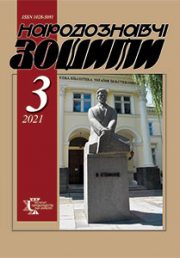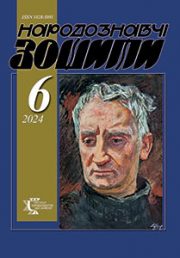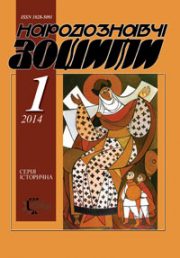The Ethnology Notebooks. 2024. № 1 (175), 205—210
UDK [398.33:27-564.12-565.9-312.8](477=161.2)”18/20″
DOI https://doi.org/10.15407/nz2024.01.205
DIAKIV Volodymyr
- ORCID: https://orcid.org/0000-0002-9513-4364
- Ph.D of Philological Sciences,
- Senior Researcher Fellow
- of the Ethnology Institute of the National Academy of Sciences of Ukraine,15, Svobody Avenue, 79008, Lviv, Ukraine;Lviv Polytechnic National University,
- Department of the Ukrainian language Institute of Humanities and Social Sciences,12, Bandera street, 79013, Lviv, Ukraine,
- Contacts: e-mail: d.v.m.1029@gmail.com
Abstract. Introduction. The relevance of this paper is conditioned by the need to explore the folk and religious beliefs and views of Ukrainians associated with the Feast of the Exaltation of the Holy Cross (Exaltation of the Holy and Life-Giving Cross of the Lord) in the context of the preconditions for the Christmas and New Year period in calendrical rites.
Problem Statement. The subject matter of the study is the folk calendrical rites of Ukrainians associated with the Feast of the Exaltation of the Holy Cross, particularly the traditional calendrical rites in the context of the preconditions for the pre-Christmas and New Year period. The scope of the study is the specific manifestations of folk Christian religiosity in these rites.
Purpose. The purpose of the outlined work is to highlight the folk and religious views and beliefs inherent in the traditional early winter period, to determine the traditions framework and further transformations, and the peculiarities of the development of ideological, substantial, and structural components, elements, and details.
Materials and Methods. The source base of the paper comprises mainly archive materials and field data, as well as academic literature on this topic. The main methods were comparative typological and culture-historical ones, as well as elements of structural and typological, geographical, and other methods of Ethnology.
Conclusion. The preconditions for the pre-Christmas and New Year period in Ukrainians’ traditional calendrical rites begin as early as during the autumn period, including on the Feast of the Exaltation of the Holy Cross. This is confirmed by the folk and religious views and beliefs representative of the traditional early winter period, in particular those associated with the observance of the rules of godly behavior, due respect for the Feast, and the appropriate celebration of the Feast of the Exaltation of the Holy Cross, etc. In these fundamentally traditional views and beliefs of Ukrainians, a particular development of certain folk and religious components is evident. Later on, Christianity put its stamp upon these beliefs and views. Christian beliefs and views merged with the previous ones, complementing and enriching them with their own images, motives, and plots in a particular way.
Keywords: the Feast of the Exaltation of the Holy Cross, folk religiosity, calendar rituality, tradition, beliefs, functioning.
Received 2.11.2023
REFERENCES
- Dyakiv, V. (2019). Feast of saint Simeon: folk religiosity in traditional calendar ritualism of Ukrainians against the background of pre-New Year and pre-Christmas period. The Ethnology Notebooks, 2 (146), 293—302. DOI: 10.15407/nz2019.02.293 [in Ukrainian].
- Dyakiv, V. (2019, october). The feast of St. Michael’s: folk religiosity against the background of pre-New Year and pre-Christmas period of calendar ritualism of Ukrainians. SWorld Journal: International periodic scientific journal. Indexed in INDEX COPERNICUS (Issue 2, part 3, pp. 66—76). Bulgaria: D.A. Tsenov Academy of Economics — Svishtov. DOI: 10.30888/2410-6615.2019- 02-03-001 [in Ukrainian].
- Dyakiv, V. (2019, october). The feast of St. Michael’s: folk religiosity against the background of pre-New Year and pre-Christmas period of calendar ritualism of Ukrainians. SCIENCE FOR MODERN HUMANITY: Conference proceedings. Indexed in INDEX COPERNICUS (Pp. 94—96). Bulgaria: SWorld & D.A. Tsenov Academy of Economics — Svishtov [in Ukrainian].
- Dyakiv, V. (2022). The Nativity of the Mother of God: folk-religious beliefs and ideas against the background of the pre-Christmas-New Year period in the calendar rituals of Ukrainians. The Ethnology Notebooks, 6 (168), 1439—1447. DOI: 10.15407/nz2022.06.1439 [in Ukrainian].
- Petrushevych, A.S. (1866). All-Russian journal of church, family and folk holidays, household chores, omens and fortune telling. Lviv [in Russian].
- Kurochkin, O. (2014). Festive Year of Ukrainians from Ancient Times to the Present (P. 392). Bila Tserkva [in Ukrainian].
- Shekeryk-Donykiv, P. (2009). The year in Hutsul beliefs. Selected works. Verkhovyna [in Ukrainian].
- Franko, I. (1898). Folk calendar. Etnohrafichnyj Zbirnyk (Vol. V, pp. 203—210) [in Ukrainian].
- Onatskyi, Y. (1964). The Feast of the Exaltation of the Holy Cross. In Onatskyi Yevhen. Ukrainian small encyclopedia: in 8 volumes and 16 books (Vol. 4, p. 487). Buenos Aires (Argentina) [in Ukrainian].
- Zhatkovych, Yu. (1896). Ethnographic Notes from Hungarian Rus. Ethnographic collection (Vol. 2, pp. 1—38) [in Ukrainian].
- Zubrytskyi, M. (1900). Folk calendar. Folk customs and beliefs associated with days of the week and yearly holidays. Materials for Ukrainian ethnology (Vol. 3, pp. 33—60 [in Ukrainian].
- Dykarev, М. (1905). Folk calendar of Valyki Uyezd (Borisovo Volost) in Voronezh region. Materials for Ukrainian ethnology (Vol. VI, pp. 114—204) [in Ukrainian].
- Shukhevych, V. (1904). Hutsulshchyna. Fourth part. XVII: Church rituals. Materials for Ukrainian ethnology (Vol. VII, pp. 1—272) [in Ukrainian].






